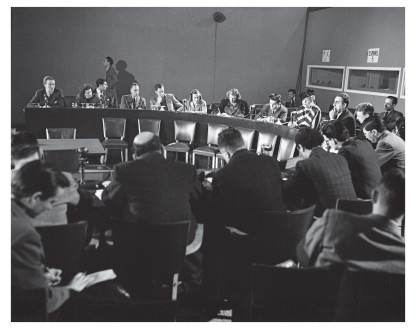Up to World War II, the prevalent view was that the substance and scope of human rights was an internal matter for national governments. The excesses of the totalitarian regimes in Nazi Germany and the Communist Soviet Union – where people were persecuted on racial, ethnic and political grounds – forced a reassessment of this notion.
On 10 December 1948, the UN General Assembly adopted the Universal Declaration of Human Rights. The Soviet Union and its satellite states did not vote in favour, as nearly all human rights were violated in these countries.
PRESS CONFERENCE OF THE UNIVERSAL DECLARATION WORKING GROUP. E. ROOSEVELT AND C. MALIK.
(© UNITED NATIONS 1948)
